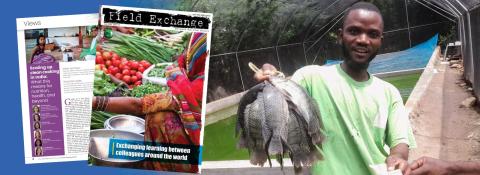Responding to nutrition in emergencies within the climate crisis
This is a summary of the following report: Nutrition in emergencies and the climate crisis: Global nutrition cluster scoping and options paper (2024) https://www.nutritioncluster.net/resources/nie-and-climate-crisis-global-nutrition-cluster-scoping-and-options-paper
Climate change is one of the world’s most pressing challenges, affecting up to 3.6 billion people in highly vulnerable contexts. The Global Nutrition Cluster (GNC) plays a crucial role in addressing this crisis within its humanitarian mandate, focusing on climate and weather shocks and seasonality shifts because of their impact on nutrition outcomes and their underlying causes. The GNC also considers environmental impacts and greenhouse gas emissions in its climate crisis work, given how environmental degradation exacerbates vulnerabilities and the climate crisis.
The GNC has been refining its approach to nutrition in emergencies (NIE) within the climate crisis, establishing a Climate Crisis Working Group and recognising climate as a strategic priority in 2023. The GNC commissioned a scoping of evidence, priorities, and opportunities across stakeholders to enhance its approach to supporting country clusters, GNC global partner agencies, and other global clusters in responding to NIE in the context of climate crisis. This scoping aimed to identify relevant opportunities for the GNC in the face of the changing humanitarian landscape due to the increased frequency and severity of extreme weather events, emerging risks like disease outbreaks, and the complex relationship between nutrition and the climate crisis.
The scoping includes an initial articulation of a climate rationale for the GNC’s approach, identifying action areas for climate crisis and NIE work and providing an overview of stakeholder needs and capacities. GNC stakeholders emphasised the importance of addressing this issue. Critical bottlenecks were identified, including existing challenges in NIE response, low government priority of the climate crisis, limited capacity to integrate climate predictions into country planning, and limited programming and coordination frameworks for climate crisis and NIE action.
To effectively address NIE in the climate crisis, the GNC supports a principled approach rather than a prescriptive one, described under four key areas. First, climate and environmental justice, anti-oppression, and localisation, ensuring the GNC's work addresses and does not worsen the unequal effects of the climate crisis on people's nutrition status and vulnerability. Second, adopting a NIE climate crisis lens so that climate crisis considerations are integrated into existing tools and approaches, for example strengthening climate risk in nutrition situation analyses. Third, climate-adapted NIE, whereby new coordination and programming approaches are developed for emerging climate-related risks, for example promoting sustainable, local solutions for complementary foods for children in emergencies and fragile settings. Finally, NIE climate and environmental impact mitigation, so that NIE programming mitigates negative climate and environmental impacts, for example in supply chains and waste management.


